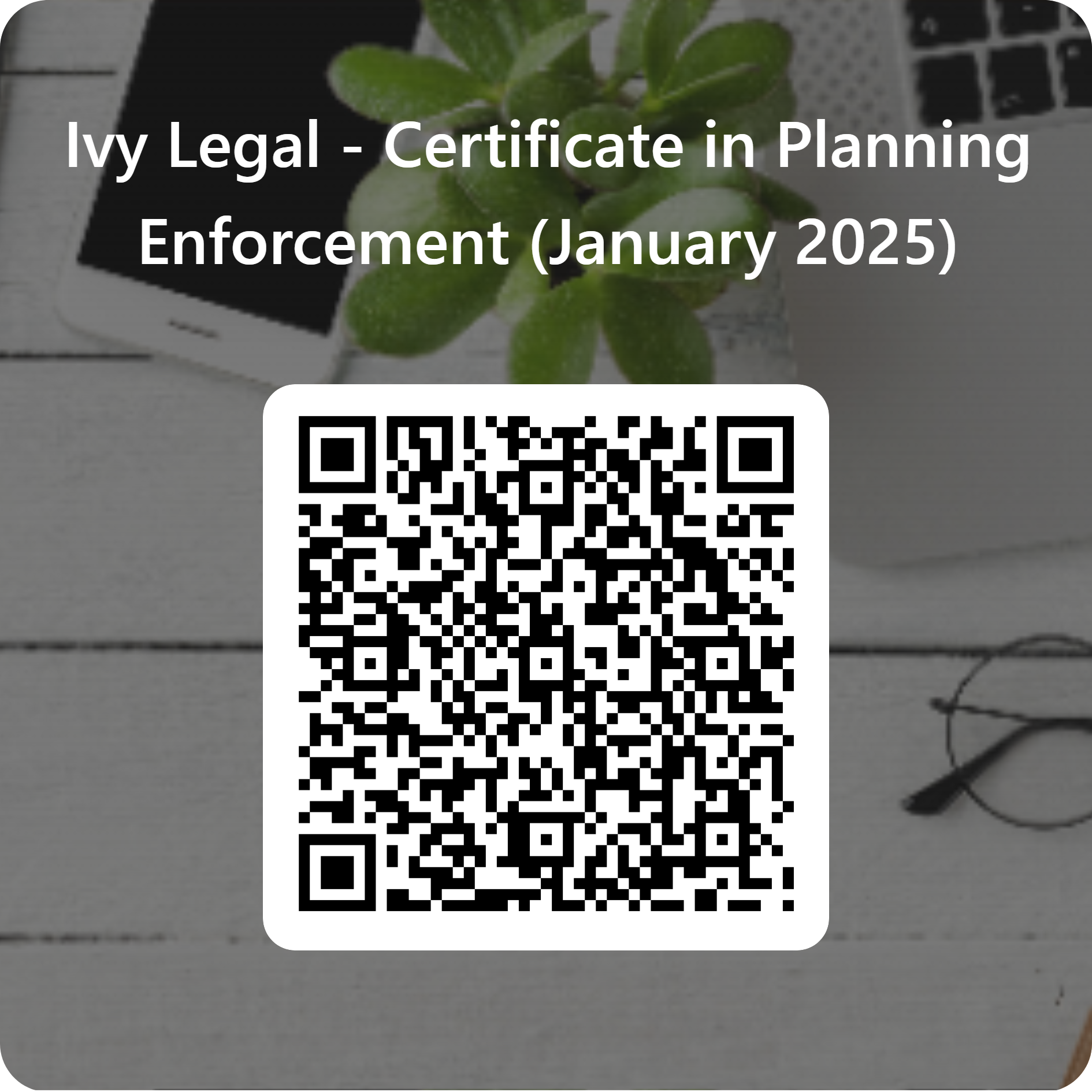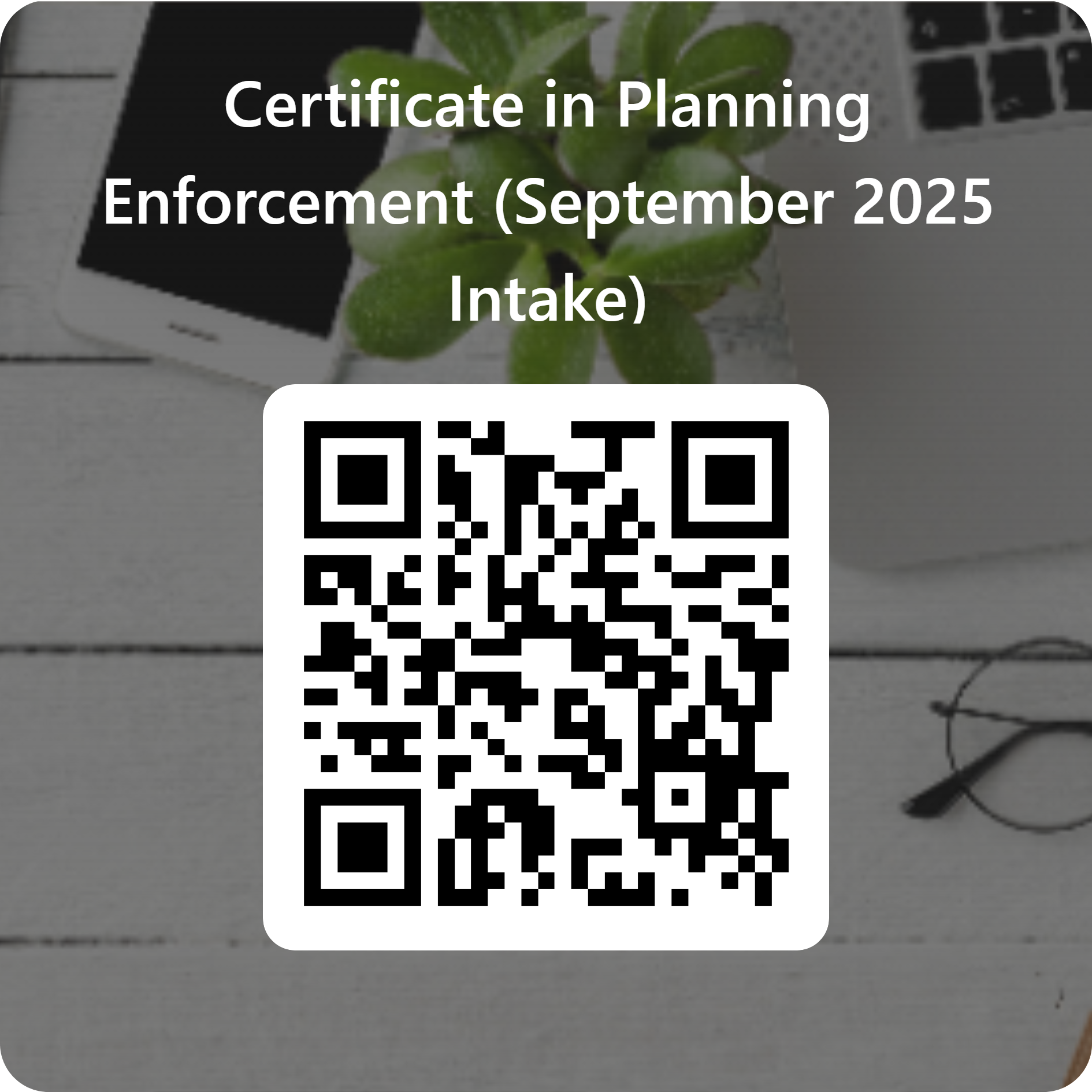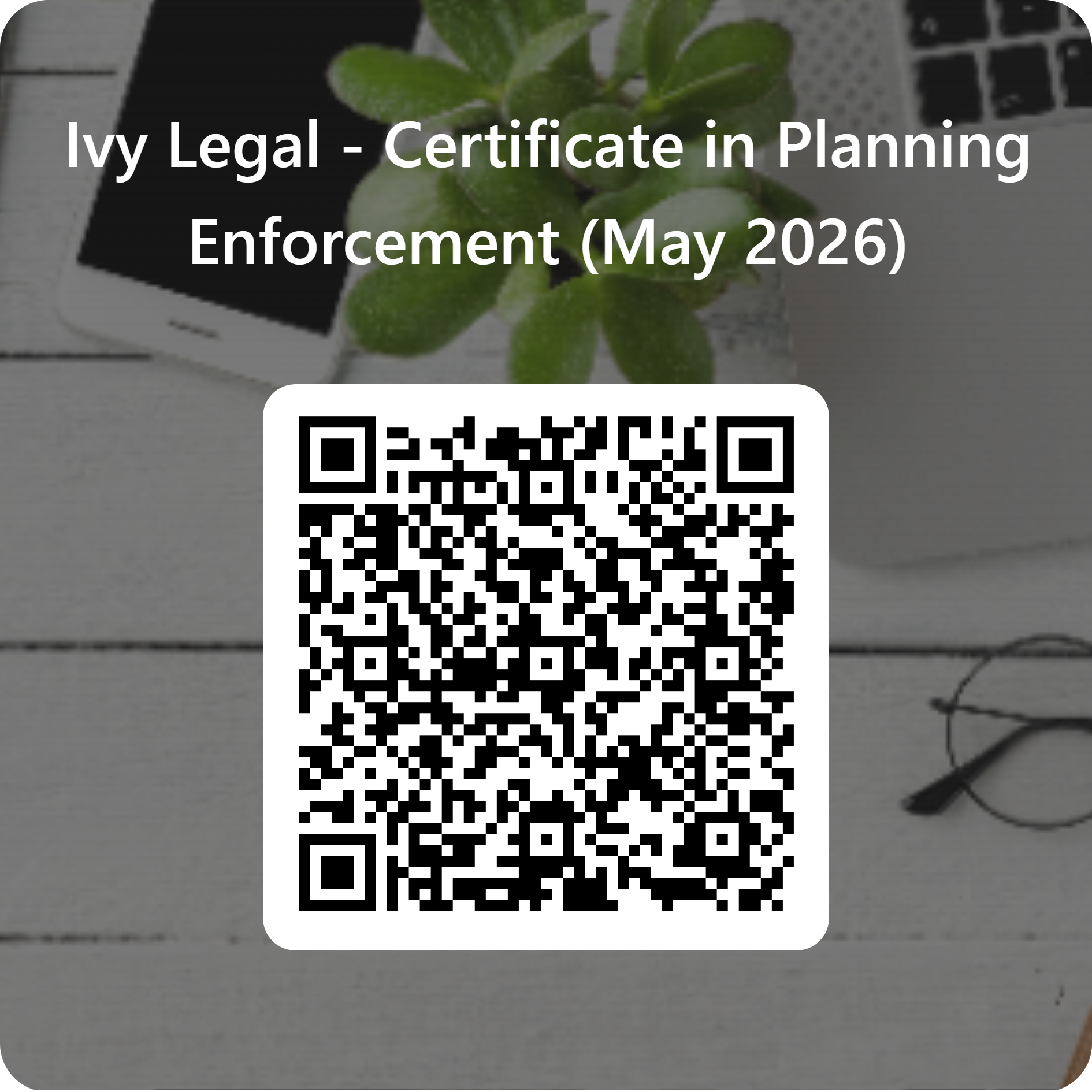Certificate in Planning Enforcement
The course is aimed at both new and more seasoned planning enforcement officers and aims to provide a thorough grounding in the legal and practical aspects of planning enforcement.
The course provides officers with a thorough grounding in the principles behind their planning enforcement powers and, through case studies and small group work, examples of the exercise of those powers in practice and the pitfalls and strategies which can be employed. Training involves a mixture of taught (online) classes, case studies and small group work and we aim to make the training days as intensive and immersive as possible.
The Certificate in Planning Enforcement consists of 4 modules and can be completed consecutively or, exceptionally, out of order.
The 1st Module of the course will be hosted residential and the other modules will be hosted virtually. Each module will follow a similar format of initial pre-reading with a multiple choice assignment within 1 month. After completion of the multiple choice assignment, delegates will attend 2 residential/online training days which are immersive and practical in nature. Finally, an essay assignment (3,000 words) will test students on their knowledge and understanding. Throughout the duration of the module, the student cohort will be encouraged to discuss practical problems with each other and their moderator. To achieve a pass on quiz and essay you will be required to achieve between 50 and 64, for a merit between 65 and 74, and for a distinction above 75. The quiz carries 20% and the essay 80% of the final module mark.
Candidates will be expected to complete initial self-study with virtual support and online multiple choice assignments prior to the training days for each Module. The two-day online training component itself will be hosted in small groups, focus on practical application of principles already learnt and will involve groupwork and assignments over the course of the two days. A final assignment will be set upon completion of the training day component and delegates will be expected to produce essays based on their learning which will be independently assessed.
Upon completion of all four modules, the course will lead
to a course completion certificate. Delegates are free to attend select modules only, but a certificate will only be provided upon completion of all four modules. Although the design of the course is such that delegates will benefit from attending the modules sequentially, modules can also be completed out of sequence.
The course will be led by Izindi Visagie, founder and partner at Ivy Legal and Mike Hyde of MH Planning Associates. Both are experienced practitioners and training presenters, having previously presented a similar course for Trevor Roberts Associates. Other course moderators may also be involved.
As Modules 2-4 are hosted virtually, delegates need to ensure they have sufficient bandwidth to enable two-way video calling on Microsoft Teams.
Course dates for January 2025 Intake
| MODULE | START DATE | TRAINING DAYS | SUBJECTS |
|---|---|---|---|
| Module 1 (Residential*) | January 2025 | 6 & 7 February 2025 | Introduction & principles |
| Module 2 (Virtual) | May 2025 | 12 & 13 June 2025 | Notices |
| Module 3 (Virtual) | September 2025 | 9 & 10 October 2025 | Appeals, prosecutions, JRs |
| Module 4 (Virtual) | January 2026 | 12 & 13 February 2026 | Specialist topics e.g. advertisements, direct action |
To sign up for remaining modules complete this
Form
Course dates for September 2025 Intake
| MODULE | START DATE | TRAINING DAYS | SUBJECTS |
|---|---|---|---|
| Module 1 (Residential*) | September 2025 | 16 & 17 October 2025 | Introduction & principles |
| Module 2 (Virtual) | January 2026 | 5 & 6 February 2026 | Notices |
| Module 3 (Virtual) | May 2026 | 11 & 12 June 2026 | Appeals, prosecutions, JRs |
| Module 4 (Virtual) | September 2026 | 15 & 16 October 2026 | Specialist topics e.g. advertisements, direct action |
Currently only 15 spaces available.
To sign up complete this
Form
Course dates for May 2026 Intake
| MODULE | DATE | COHORTS | SUBJECTS |
|---|---|---|---|
| Module 1 (Residential*) | May 2026 | 25 & 26 June 2026 | Introduction & principles |
| Module 2 (Virtual) | September 2026 | 8 & 9 October 2026 | Notices |
| Module 3 (Virtual) | January 2027 | 4 & 5 February 2027 | Appeals, prosecutions, JRs |
| Module 4 (Virtual) | May 2027 | 10 & 11 June 2027 | Specialist topics e.g. advertisements, direct action |
Currently only 20 spaces available.
To sign up complete this
Form
Course outline
Module 1 (Residential*)
- Introduction and principles of planning enforcement
- Development, permission, immunity and expediency
- Investigation powers, entry powers, safe working practices, sources of information
- Negotiation and effective enforcement
Module 2 (Virtual)
- Enforcement Notices and Breach of Condition notices – basis for issue, delegated powers, notice requirements, identifying the breach, identifying the steps, service and registration requirements.
- Getting the notice and report right
Module 3 (Virtual)
Appeals – preparation at notice stage, how to defend the appeal, different processes, roles of planning enforcement officer and/or advocate, evidence rules, practical application of the burden of proof.
- Prosecutions – the offences, rules of evidence, how to write summons and witness statement, how to give evidence
- Court challenges – s288 and 289 reviews and residual judicial review, nullity
Module 4 (Virtual)
- Specialisms - trees, listed buildings and adverts
- Specialist subjects, including gypsy & traveller cases, outbuildings, shisha, kiosks
The structure for all 4 modules each consists of
- A self-study component, followed by the
- Completion of a quiz, then
- Attendance of two on-line training days and concluding with the
- Submission of an essay.
* Module 1 has a compulsory residential component instead of the on-line training. This will mean travelling to Madingley Hall in Cambridge to start the training at 10am on 18 June 2026 , staying overnight and concluding at 4pm on 19 June 2026. An initial module of in-person training will allow you to get to know your trainers and your fellow delegates better and will allow for more spontaneous discussions and learning at the residential course. We can build on these relationships during the on-line training for the remaining modules. Meeting fellow delegates is also invaluable in terms of sharing best practice and developing relationships between local authorities.
Modules 2 – 4 will remain exclusively on-line (Virtual).
The costs for the residential component are included in the Certificate course fees but you will be responsible for your own travel arrangements.
Cost
£ 1 500 plus VAT per module











